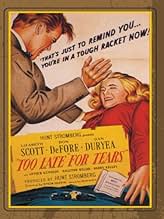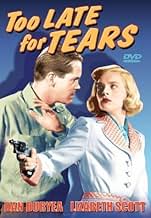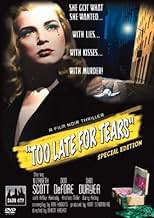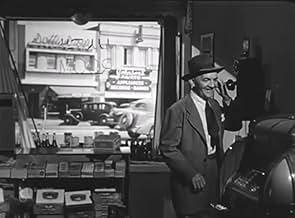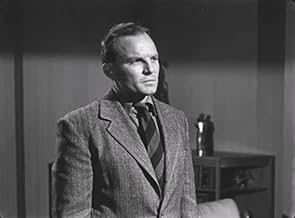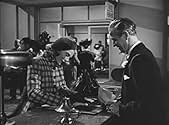IMDb-BEWERTUNG
7,3/10
6271
IHRE BEWERTUNG
Füge eine Handlung in deiner Sprache hinzuThrough a fluke circumstance, a ruthless woman stumbles across a suitcase filled with $60,000, and is determined to hold onto it even if it means murder.Through a fluke circumstance, a ruthless woman stumbles across a suitcase filled with $60,000, and is determined to hold onto it even if it means murder.Through a fluke circumstance, a ruthless woman stumbles across a suitcase filled with $60,000, and is determined to hold onto it even if it means murder.
- Auszeichnungen
- 2 wins total
Jimmy Ames
- Fat Man
- (Nicht genannt)
Georgia Backus
- Woman
- (Nicht genannt)
Robert Bice
- Policeman
- (Nicht genannt)
Paul Bradley
- Hotel Clerk
- (Nicht genannt)
John Butler
- Little Man Answering Phone
- (Nicht genannt)
David Clarke
- Jack Sharber
- (Nicht genannt)
Jimmie Dodd
- Second Car Thief
- (Nicht genannt)
Renee Donatt
- Young Lover in Boat
- (Nicht genannt)
Charles Flynn
- Policeman
- (Nicht genannt)
Billy Halop
- Boat Attendant
- (Nicht genannt)
Richard Irving
- First Car Thief
- (Nicht genannt)
Perry Ivins
- Checkroom Attendant
- (Nicht genannt)
Empfohlene Bewertungen
Byron Haskin of Arsenic and Old Lace and War of the Worlds fame teamed up with Roy Huggins to create this solid film noir entry. Huggins writing is superb for the genre - neither pretentious nor overly manic. The pace is brisk but not painfully so. And the film is very well conceived, well directed, well edited and very well acted.
The remarkable Lizabeth Scott (Jane Palmer), married to a young Arthur Kennedy (Alan Palmer), is the focus of our attention. The coupled are driving to a friend's house when a car flashes them and its occupant tosses a leather bag with 60,000 dollars into their car and drives off. Jane wants to keep it, Alan wants to turn it in. Soon, this windfall becomes a mixed blessing, as it reveals a rather frightening side of Jane's personality. The plot intertwines noir twists and turns and incessant mystery and, frequently, winds up in unanticipated places.
Lizabeth Scott is PERFECT, and really MAKES this film as much as the intriguing story and successful directing. Don Defore also turns in a notable performance as does Kristine Miller. Dan Duryea was nicely cast in his role as the heavy, but his performance here was just a sliver below his usual par.
This is very nice bit of noir cinema and will satisfy most noir fans, as well as modern crime drama aficionados. Recommended!
The remarkable Lizabeth Scott (Jane Palmer), married to a young Arthur Kennedy (Alan Palmer), is the focus of our attention. The coupled are driving to a friend's house when a car flashes them and its occupant tosses a leather bag with 60,000 dollars into their car and drives off. Jane wants to keep it, Alan wants to turn it in. Soon, this windfall becomes a mixed blessing, as it reveals a rather frightening side of Jane's personality. The plot intertwines noir twists and turns and incessant mystery and, frequently, winds up in unanticipated places.
Lizabeth Scott is PERFECT, and really MAKES this film as much as the intriguing story and successful directing. Don Defore also turns in a notable performance as does Kristine Miller. Dan Duryea was nicely cast in his role as the heavy, but his performance here was just a sliver below his usual par.
This is very nice bit of noir cinema and will satisfy most noir fans, as well as modern crime drama aficionados. Recommended!
No need to recap the convoluted plot. The movie's a sleeper among noirs, thanks mainly to an unpredictable and well thought-out screenplay from writer Huggins. Just when you think you've got things figured, you don't. I especially like the way Huggins subtly reverses Jane's (Scott) and Danny's (Duryea) competitive relationship. Watching the two circle each other is like watching two hungry sharks. Apparently, they want to mate but don't dare get too close. Note too, how effectively director Haskin uses the stylish wide-brimmed hats to veil the identity of men entering a room. I don't recall this clever effect in any other film. This is also one of the few noirs to make the central character a woman (Jane) instead of a man.
Then too, it's a very well cast movie. Duryea is of course Duryea, a major icon of noir. On the other hand, Scott was always more a presence than an actress. Still, her presence here is used to good effect as a greedy spider woman, even if she doesn't achieve much depth. But I especially like the underrated Don DeFore. His trademark nice guy is also used to good effect in what turns out to be something more than just a nice guy. (Be sure to catch ex-Dead End kid Billy Halop as the cranky boat manager.)
I guess the only missing element from classic noir are the angular shadows of moral ambivalence. Haskin does film a number of night scenes, but I don't spot the classic lighting. Perhaps that's because his specialty as a director was science fiction and adventure films. Anyway, I'm not sure why this withering little drama hasn't achieved more recognition. Maybe it's because it was an independent production without studio backing. But whatever the reason, the movie remains a gritty little noir worth catching up with.
Then too, it's a very well cast movie. Duryea is of course Duryea, a major icon of noir. On the other hand, Scott was always more a presence than an actress. Still, her presence here is used to good effect as a greedy spider woman, even if she doesn't achieve much depth. But I especially like the underrated Don DeFore. His trademark nice guy is also used to good effect in what turns out to be something more than just a nice guy. (Be sure to catch ex-Dead End kid Billy Halop as the cranky boat manager.)
I guess the only missing element from classic noir are the angular shadows of moral ambivalence. Haskin does film a number of night scenes, but I don't spot the classic lighting. Perhaps that's because his specialty as a director was science fiction and adventure films. Anyway, I'm not sure why this withering little drama hasn't achieved more recognition. Maybe it's because it was an independent production without studio backing. But whatever the reason, the movie remains a gritty little noir worth catching up with.
Lizabeth Scott did her best remembered work in film noir (more than half of her only 21 screen credits fall within the noir cycle), and became one of its iconic faces. Rarely, however, was she called upon to play the fully-fledged femme fatale, and there's probably a reason for this: She couldn't bring off duplicity.
Her smile had no shadings into wry, or ironic, or smirky; it had but one setting a fresh, guileless grin that lit up like a Christmas tree. F. Scott Fitzgerald (in his sad screenwriting days) observed of Joan Crawford that you couldn't give her a simple stage direction like `telling a lie' because then she'd give an impersonation of Benedict Arnold betraying West Point to the British. But Scott can't manage even that, which results in confusingly mixed signals when her characters are motivated by malice, like Coral Chandler in Dead Reckoning: Her smile keeps convincing us that she's on the up-and-up.
Her damn smile keeps switching on in Too Late For Tears, even though there's no doubt that she's one hard, cold case. She and husband Arthur Kennedy are bickering one night en route to a party in the Hollywood Hills when suddenly a suitcase crammed with cash lands in their roadster. He wants to turn it over to the police, but she persuades him to think it over, so they check the valise at Union Station. When she starts buying clothes and furs against the checked capital, it's clear she has no intention of surrendering the windfall; we learn that her background was `white-collar poor, middle-class poor,' and that she'd made a previous marriage solely for money.
Strange men start ringing her doorbell. First Dan Duryea shows up, a blackmailer for whom the payoff was intended. He slaps her around playfully (`What do they call you besides stupid,' she taunts him. `Stupid will do if you don't bruise easily,' he purrs back). Quickly Scott maneuvers Duryea into helping him murder Kennedy but still won't tell him where the money's stashed. Though wary, he falls for her, starts hitting the bottle, and grows careless. Meanwhile, Kennedy's sister (Kristine Miller) harbors suspicions about his mysterious disappearance. When the next caller (Don DeFore) shows up, claiming to be an old Air Corps buddy of Kennedy's, she makes an alliance with him to find out what's really going on. And the claim ticket for the money keeps changing hands....
The plot is none too simple, and in consequence director Byron Haskin spends a lot of time trying to keep it clear rather than addressing some questions about character and logic that inevitably arise. Why did the avaricious, manipulative Scott marry Kennedy in the first (or second) place? Why does the sister live so conveniently close? How did Duryea, and for that matter DeFore, find Scott so easily? But few thriller plots are so tightly constructed that they survive rigorous analysis. Too Late For Tears passes muster as hard-boiled, late-40s noir and as one of Scott's hardest, strongest performances, inappropriate smile and all.
Her smile had no shadings into wry, or ironic, or smirky; it had but one setting a fresh, guileless grin that lit up like a Christmas tree. F. Scott Fitzgerald (in his sad screenwriting days) observed of Joan Crawford that you couldn't give her a simple stage direction like `telling a lie' because then she'd give an impersonation of Benedict Arnold betraying West Point to the British. But Scott can't manage even that, which results in confusingly mixed signals when her characters are motivated by malice, like Coral Chandler in Dead Reckoning: Her smile keeps convincing us that she's on the up-and-up.
Her damn smile keeps switching on in Too Late For Tears, even though there's no doubt that she's one hard, cold case. She and husband Arthur Kennedy are bickering one night en route to a party in the Hollywood Hills when suddenly a suitcase crammed with cash lands in their roadster. He wants to turn it over to the police, but she persuades him to think it over, so they check the valise at Union Station. When she starts buying clothes and furs against the checked capital, it's clear she has no intention of surrendering the windfall; we learn that her background was `white-collar poor, middle-class poor,' and that she'd made a previous marriage solely for money.
Strange men start ringing her doorbell. First Dan Duryea shows up, a blackmailer for whom the payoff was intended. He slaps her around playfully (`What do they call you besides stupid,' she taunts him. `Stupid will do if you don't bruise easily,' he purrs back). Quickly Scott maneuvers Duryea into helping him murder Kennedy but still won't tell him where the money's stashed. Though wary, he falls for her, starts hitting the bottle, and grows careless. Meanwhile, Kennedy's sister (Kristine Miller) harbors suspicions about his mysterious disappearance. When the next caller (Don DeFore) shows up, claiming to be an old Air Corps buddy of Kennedy's, she makes an alliance with him to find out what's really going on. And the claim ticket for the money keeps changing hands....
The plot is none too simple, and in consequence director Byron Haskin spends a lot of time trying to keep it clear rather than addressing some questions about character and logic that inevitably arise. Why did the avaricious, manipulative Scott marry Kennedy in the first (or second) place? Why does the sister live so conveniently close? How did Duryea, and for that matter DeFore, find Scott so easily? But few thriller plots are so tightly constructed that they survive rigorous analysis. Too Late For Tears passes muster as hard-boiled, late-40s noir and as one of Scott's hardest, strongest performances, inappropriate smile and all.
Came across this one by accident. A hard-to-find forgotten film of the 40's turned out to be right behind "Out Of The Past", in my opinion the best of the Noir genre. A cheapie 'B', It is Miss Scotts' picture and she is ably assisted by an 'A'cast. Dependable Arthur Kennedy plays her befuddled husband and Dan Duryea is the heavy, complete with trademark sardonic grin.
'B's don't usually get a script or a storyline of this calibre. There are several plot twists which make the film completely absorbing and make it a very swift 99 minutes.I found it in a DVD collection but if it ever shows up on TCM, do yourself a favor and try not to miss this one - it is exceptional.
'B's don't usually get a script or a storyline of this calibre. There are several plot twists which make the film completely absorbing and make it a very swift 99 minutes.I found it in a DVD collection but if it ever shows up on TCM, do yourself a favor and try not to miss this one - it is exceptional.
Made in 1949 this is one of those films that is a must for all noir fans. Do be warned though as this fell out of copyright some years ago and was widely duplicated – often very badly – but this is the restored version and is an absolute gem.
Late one night a couple are driving to a party that is far from inviting when a slow car tosses a bag into their open top car. The bag is choc full f cash. The wife is Jane Palmer (Lizabeth Scott) and she decides that she is going to hang onto the cash – despite what her husband wants. So she decides to convince him to keep it. He is cut from a different cloth and it soon becomes apparent how far she will go to keep it.
Now Lizabeth Scott is a show stealer here and that is even though everyone else is great too. She is so convincing as the manipulative and self centred vixen and I just loved it. As I said earlier watch out for poor copies or better still get the restored version. For those of you that love fashion, there are some timeless and elegant gowns on display here too and the men all wear zoot suits so you can't win 'em all. This is a must for all fans of the genre and one that has aged with style.
Late one night a couple are driving to a party that is far from inviting when a slow car tosses a bag into their open top car. The bag is choc full f cash. The wife is Jane Palmer (Lizabeth Scott) and she decides that she is going to hang onto the cash – despite what her husband wants. So she decides to convince him to keep it. He is cut from a different cloth and it soon becomes apparent how far she will go to keep it.
Now Lizabeth Scott is a show stealer here and that is even though everyone else is great too. She is so convincing as the manipulative and self centred vixen and I just loved it. As I said earlier watch out for poor copies or better still get the restored version. For those of you that love fashion, there are some timeless and elegant gowns on display here too and the men all wear zoot suits so you can't win 'em all. This is a must for all fans of the genre and one that has aged with style.
Wusstest du schon
- WissenswertesThe UCLA Film and Television Archive has remastered Der blonde Tiger (1949) from a recently discovered original print. The restoration process took five years after the print was discovered in France, and involved piecing segments of another copy into the restored version to have a complete film. The restoration was funded by the Film Noir Foundation. The restored version was broadcast on 7/17/2015, on the Turner Classic Movies network in pristine condition. The restored version of the film was released in 2016 on Blu-ray in the United States and the United Kingdom. The film has developed a cult following in the years since its release.
- PatzerJane tells Alan that the $790 she has spent represents about one tenth of a percent of the money in the satchel. Since they thought they had $100,000 (later determined by Danny the blackmailer to be $60,000). One tenth of a percent of 100,000 would be $100, so she spent closer to eight tenths of a percent of what she thought they had. A tenth of a percent of $60,000 would be $60, and $790 would be slightly over 1.3 per cent of that amount.
- Zitate
Danny Fuller: Don't ever change, Tiger. I don't think I'd like you with a heart.
- VerbindungenEdited into Your Afternoon Movie: Too Late for Tears (2022)
Top-Auswahl
Melde dich zum Bewerten an und greife auf die Watchlist für personalisierte Empfehlungen zu.
- How long is Too Late for Tears?Powered by Alexa
Details
- Laufzeit1 Stunde 39 Minuten
- Farbe
- Seitenverhältnis
- 1.37 : 1
Zu dieser Seite beitragen
Bearbeitung vorschlagen oder fehlenden Inhalt hinzufügen

Oberste Lücke
By what name was Der blonde Tiger (1949) officially released in India in English?
Antwort

